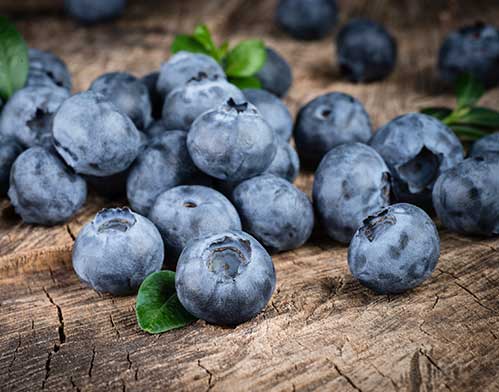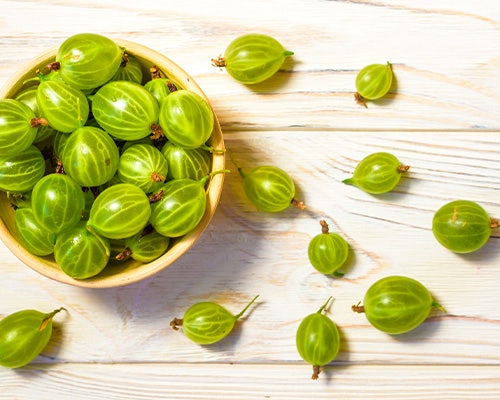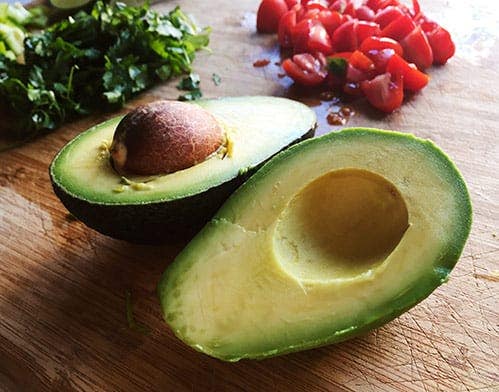Organic Alaskan Blueberries
- 7/24/15

By Dawn Thorpe Jarvis, M.S., R.D., L.D.N.
Garden of Life® Senior Director of Nutrition Science & Educational Content
When the United States Department of Agriculture (USDA) compared the antioxidant capacity of more than 20 different fruits, blueberries were at the top of the list. The study found that a one-cup serving of wild blueberries had more antioxidant capacity than a comparable serving of cranberries, strawberries, plums or raspberries. Interestingly, the antioxidant capacity of wild blueberries was 48 percent higher than that of cultivated blueberries. The flavonoids in blueberries confer strong anti-inflammatory as well as antioxidant effects. They have also been shown to support cardiovascular health, support healthy blood sugar levels as well as protect our eyesight.†
Ask Dr. David Perlmutter, a board-certified neurologist who is considered one of America’s leading brain-health experts, and he will tell you that blueberries are good for your brain and protect it. Emerging research suggests that flavonoids in blueberries may improve memory, learning and general cognitive function.† Studies comparing dietary habits with cognitive function in adults hint that consuming flavonoids may help slow the decline in mental faculty that is often seen with aging, and might even provide some protection against disorders such as Alzheimer’s and Parkinson’s.†
Garden of Life has recently sourced Alaskan blueberries, which are exceptionally rich in beneficial flavonoids and other nutrients. A fascinating thing happens when plants are subjected to the severe growing conditions of the Alaskan Wilderness. The near 24 hours of sunlight during the summer growing season creates a high level of UV exposure, while the frigid temperatures of the Alaskan winter and the year-round cold soil temperature stress the plant root systems. The plants respond by producing natural stress–fighting compounds, particularly flavonoids, which are extremely beneficial to our health. In fact, Alaskan blueberries contain up to 10 TIMES THE BIOACTIVE COMPOUNDS AND ANTIOXIDANT CAPACITY WHEN COMPARED TO BERRIES GROWN IN LOWER LATITUDES!
This information is intended for educational and informational purposes only. It should not be used in place of an individual consultation or examination or replace the advice of your health care professional and should not be relied upon to determine diagnosis or course of treatment.
Garden of Life® Senior Director of Nutrition Science & Educational Content
Natural Wonders From the Land of the Midnight Sun
Blueberries are often described as superfruits because they are considered to be one of the richest food sources of antioxidants. Blueberries obtain their wonderful rich blue color from natural pigments called anthocyanins, which are flavonoids. These natural compounds provide the high antioxidant content and many of the health benefits. Rich in vitamin C along with a high level and wide spectrum of antioxidants, blueberries protect cells from damage.When the United States Department of Agriculture (USDA) compared the antioxidant capacity of more than 20 different fruits, blueberries were at the top of the list. The study found that a one-cup serving of wild blueberries had more antioxidant capacity than a comparable serving of cranberries, strawberries, plums or raspberries. Interestingly, the antioxidant capacity of wild blueberries was 48 percent higher than that of cultivated blueberries. The flavonoids in blueberries confer strong anti-inflammatory as well as antioxidant effects. They have also been shown to support cardiovascular health, support healthy blood sugar levels as well as protect our eyesight.†
Ask Dr. David Perlmutter, a board-certified neurologist who is considered one of America’s leading brain-health experts, and he will tell you that blueberries are good for your brain and protect it. Emerging research suggests that flavonoids in blueberries may improve memory, learning and general cognitive function.† Studies comparing dietary habits with cognitive function in adults hint that consuming flavonoids may help slow the decline in mental faculty that is often seen with aging, and might even provide some protection against disorders such as Alzheimer’s and Parkinson’s.†
Garden of Life has recently sourced Alaskan blueberries, which are exceptionally rich in beneficial flavonoids and other nutrients. A fascinating thing happens when plants are subjected to the severe growing conditions of the Alaskan Wilderness. The near 24 hours of sunlight during the summer growing season creates a high level of UV exposure, while the frigid temperatures of the Alaskan winter and the year-round cold soil temperature stress the plant root systems. The plants respond by producing natural stress–fighting compounds, particularly flavonoids, which are extremely beneficial to our health. In fact, Alaskan blueberries contain up to 10 TIMES THE BIOACTIVE COMPOUNDS AND ANTIOXIDANT CAPACITY WHEN COMPARED TO BERRIES GROWN IN LOWER LATITUDES!
ABOUT DAWN THORPE JARVIS, MS, RD, LDN
Senior Director of Nutrition Science & Educational Content
Dawn has been with Garden of Life since 2003. She has a BS in Clinical Dietetics from Leeds (UK) and became a Registered Dietitian in 1980. She worked as a Clinical Dietitian in several London Teaching Hospitals and then joined a specialized Clinical Nutrition company and for 8 years worked her way from sales rep, to regional sales manager to marketing manager. Dawn maintained a Private Nutrition Practice specializing in weight loss and sports nutrition.This information is intended for educational and informational purposes only. It should not be used in place of an individual consultation or examination or replace the advice of your health care professional and should not be relied upon to determine diagnosis or course of treatment.





